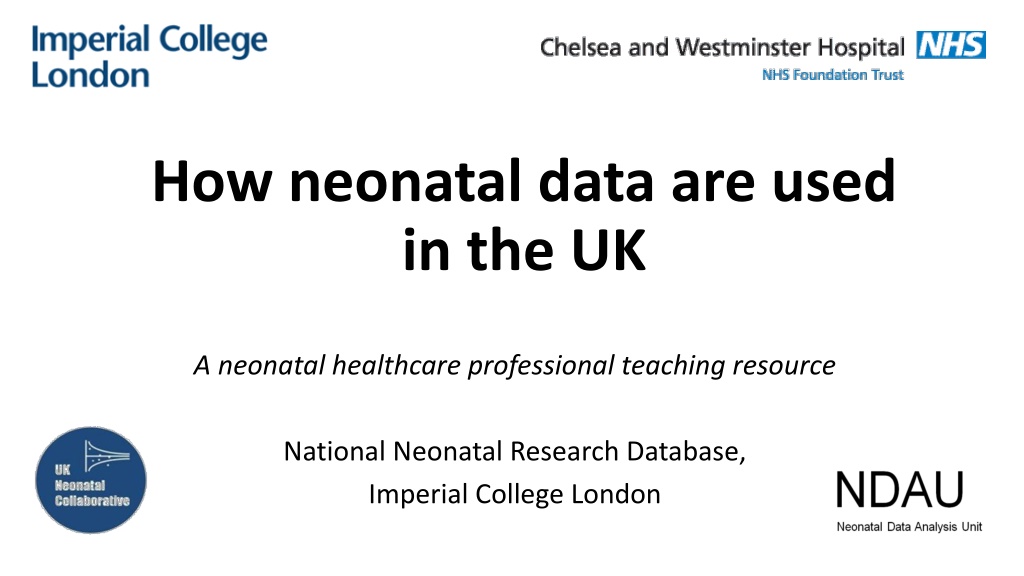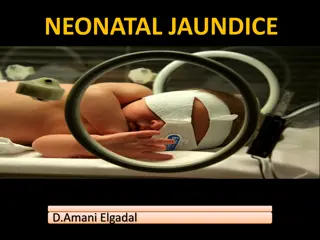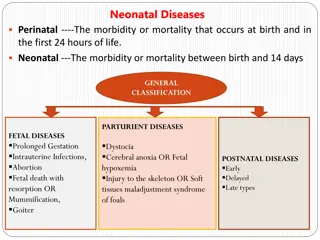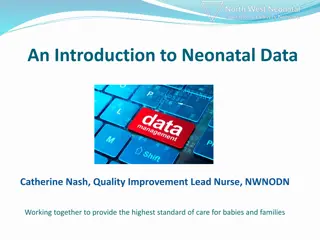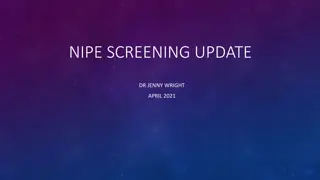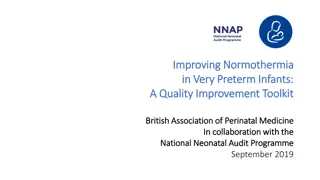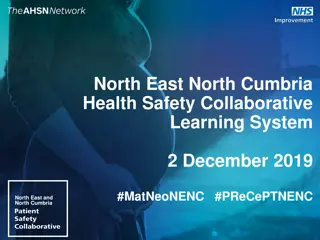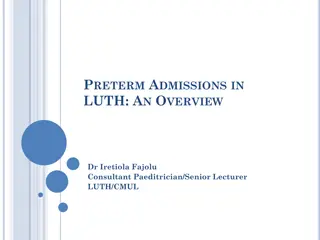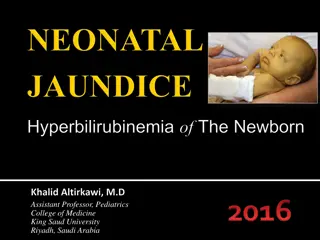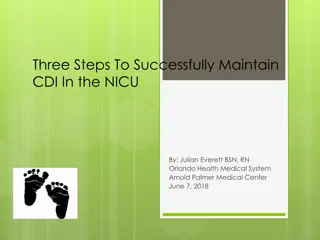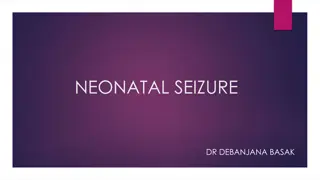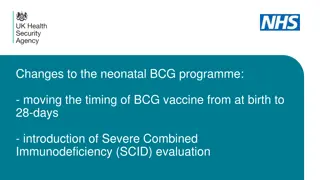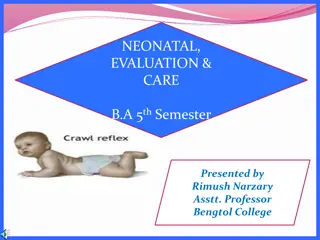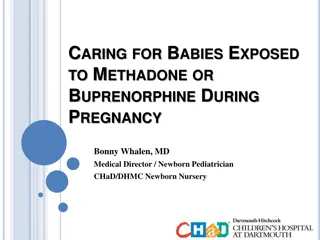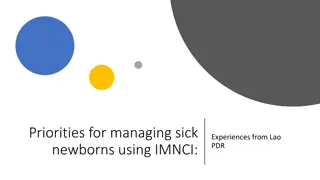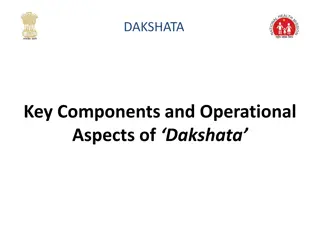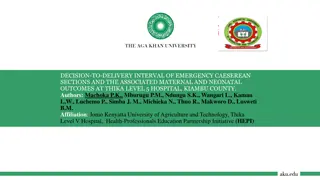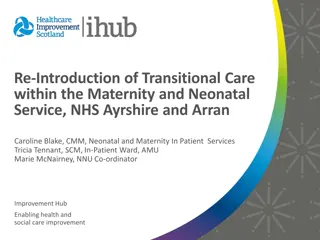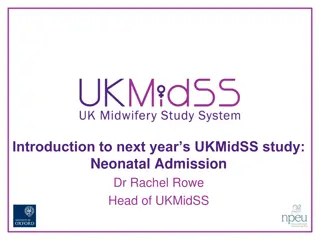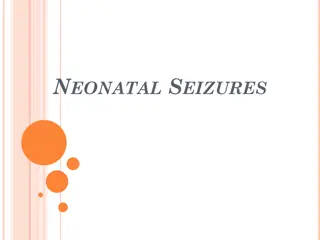Understanding Neonatal Data Usage in the UK Healthcare System
Neonatal data plays a crucial role in assessing the quality of care provided to newborns in the UK. This resource from the National Neonatal Research Database at Imperial College London sheds light on how neonatal data is collected, utilized, and shared among healthcare professionals. The importance of neonatal data, challenges in learning about it, the organizations involved, and future prospects are explored in detail, emphasizing the significance of accurate record-keeping in neonatal medicine.
Download Presentation

Please find below an Image/Link to download the presentation.
The content on the website is provided AS IS for your information and personal use only. It may not be sold, licensed, or shared on other websites without obtaining consent from the author. Download presentation by click this link. If you encounter any issues during the download, it is possible that the publisher has removed the file from their server.
E N D
Presentation Transcript
How neonatal data are used in the UK A neonatal healthcare professional teaching resource National Neonatal Research Database, Imperial College London
Developed by Dr Tim van Hasselt (NNRD Board trainee representative) Dr T ng Chang (BAPM Data and Informatics Steering Group trainee representative) Dr Philippa Rees (NNRD Board trainee representative) With help from Dr Cheryl Battersby (BAPM Data Lead; Clinical Senior Lecturer in Neonatal Medicine, Imperial College London) Dr Vimal Vasu (NNRD Board UK Neonatal Collaborative representative; Consultant Neonatologist, East Kent Hospitals NHS Trust; Honorary Senior Lecturer, University of Kent) Professor Neena Modi (NNRD lead; Professor of Neonatal Medicine, Imperial College London)
Why do neonatal data matter? High quality neonatal care is important Neonatal care is a specialised, technical, fast-changing field, with a unique population and has lifelong implications Neonatal data are important to understand the quality of neonatal care National neonatal data can be used for multiple purposes, providing a world- leading opportunity for service development and research The UK neonatal community is leading the way Neonatal medicine is leading the way for electronic data within UK medical specialities, with national data collection from routine healthcare records
Challenges of learning about neonatal data NDAU UKNC Lots of acronyms! (Neonatal Data Analysis Unit) (UK Neonatal Collaborative) Lots of organisations! NNRD NNAP (National Neonatal Research Database) Changing all the time! (National Neonatal Audit Programme)
Aims and objectives How neonatal data are shared in the UK Some of the organisations involved in neonatal data How neonatal data are making a difference The rights of patients and their families The future for neonatal data
Neonatal data: Data entry Neonatal healthcare professionals enter patient data using electronic systems such as Badger, Cerner and EPIC Routine data include e.g. birth weight, gestational age, admission temperature, daily care summaries Different systems have different approaches to storing equivalent data Routine clinical work generates important national data
Neonatal data: Funding neonatal units The Neonatal Critical Care Minimum Dataset is a list of data variables used to assign Healthcare Resource Group codes These determine payment for neonatal care (the National Tariff Payment System) For example, recording that a baby is ventilated by endotracheal tube identifies that baby as receiving neonatal intensive care, which will be funded accordingly Accurate data are essential to ensure that neonatal units are funded for their work www.bapm.org
Neonatal data: Data sharing UK neonatal units share neonatal data with bodies such as the National Neonatal Research Database (NNRD) and the National Neonatal Audit Programme (NNAP) Parents have the right to opt-out of sharing their baby s data 400+ data items that make up the Neonatal Data Set are sent to the Neonatal Data Analysis Unit to form the NNRD The Neonatal Data Set is an NHS Information Standard (DAPB1595) Prior to incorporation into the NNRD, data are quality-assured and curated National data are shared, and transferred securely
The UK Neonatal Collaborative (UKNC) All UK neonatal units that provide data to the NNRD make up the UK Neonatal Collaborative (UKNC) For more information on the UK Neonatal Collaborative please visit: https://www.imperial.ac.uk/neonatal-data-analysis- unit/neonatal-data-analysis-unit/list-of-national-neonatal- units Your UK NNC representative on the NNRD Steering Board is Dr Vimal Vasu (Consultant Neonatologist). If you have any matters that you wish to raise with the NNRD please feel free to contact him at vimal.vasu@nhs.net
National Neonatal Research Database (NNRD) Established in 2007 with the support of BAPM and funding through grants and donations, including start-up funding from the Department of Health Based on the principle of enter high quality data once and use for multiple outputs Receives and quality-assures Neonatal Data Set items (400+ per baby) from UK neonatal units within the UK Neonatal Collaborative (UKNC) Over one million babies and 10 million days of care data in database to date; 100,000 new patients added each year Data undergo quality-assurance and curation; this is important as data from electronic patient records are dirty ; i.e. they contain errors, and vary from day to day as they are real-time Run from the Neonatal Data Analysis Unit (NDAU) at Imperial College London NNRD Board has representation from parents, paediatric trainees, neonatal units from across the UK, neonatal nurses, Neonatal Specialised Commissioning, BAPM, and Bliss
Patient and family rights Babies data stored in NNRD are de-identified, so effectively anonymous to researchers; individual babies are not identifiable Families are offered the opportunity to opt outof their baby s data being shared, stored, and used for research and audit Families should approach their neonatal unit to opt out or use the national opt-out (England only) A parent information leaflet is available from the NNRD website Information on neonatal data should be included in family information packs
Patient and family information The NNRD team has produced a poster for parents and families explaining how neonatal data helps improve care for babies To obtain an electronic copy of this poster for your unit, please contact the UKNC or NNRD team, or access the NNRD website
How neonatal data are improving care for our patients You: Helping improve neonatal outcomes Shared data: NNRD The UK Neonatal Collaborative Neonatal research UK Neonatal Collaborative all neonatal units in England, Wales, and Scotland National Neonatal Research Database (NNRD) Audit You enter routine electronic clinical data Efficient data: Entered once, Multiple outputs Cleaned, verified, secure data Benchmarking Board representation including parents, neonatal staff, trainees, and academics Quality improvement Find out more at: www.imperial.ac.uk/neonatal-data- analysis-unit Neonatal Medicine Research Group Lead: Professor Neena Modi Email: ndau@imperial.ac.uk
Important outputs from neonatal data that benefit patient care Audit, governance, benchmarking and policy Research
Audit, governance, benchmarking & policy National Neonatal Audit Programme (NNAP) Uses EPR data for national audit of key neonatal care process and outcome measures National PReCePT Programme Evaluation Uses NNRD data to evaluates whether the PReCePT Quality Improvement intervention improves uptake of antenatal Magnesium Sulphate National Pregnancy in Diabetes Audit Uses NNRD data to examine outcomes of babies born to women with pre-existing diabetes National Maternal and Neonatal Policy Research Unit at the National Perinatal Epidemiology Unit, University of Oxford Uses NNRD data for policy research and development for the Department of Health
Research WHEAT Trial - WithHolding Enteral feeds Around packed red cell Transfusion Pilot trial, showed a clinical trial can be completed using only routinely collected data The impact of inter-hospital transportation: Neonatal outcomes and implications for families NNRD data examining patterns and trends in neonatal unit transfers in a centralised network system, and the potential impact on families Inhaled nitric oxide (iNO) National data exploring trends in iNO usage among preterm infants
How can I use neonatal data? Local neonatal unit data: download directly from your electronic patient record system, speak to your neonatal unit lead, no cost Regional neonatal network data: speak to your network data lead, no cost National neonatal data: Apply to NNRD, this will require research ethics approval for research use and funding to cover NNRD costs for data transfer, storage, regulatory approvals, management, and processing
How can I use the NNRD? NNRD access applications are through the Health Data Research UK (HDR-UK)Innovation Gateway The HDR-UK Gateway provides a search engine for UK health datasets NHS England (previously NHS Digital) can link datasets, and provide researchers with anonymised data; there is a cost for this service
Why link datasets? For example: neoWONDER: Neonatal whole population data linkage approach to improving long-term health and wellbeing of preterm and sick babies Linking NNRD with education and health data Understanding the impact of preterm birth and neonatal care on childhood physical, mental health, and educational outcomes
Organisations advocating the benefits of well- governanced use of quality assured neonatal data UK national charity for babies born premature or sick and their families Supports families on neonatal units, supports families involved in research, provides online resources Professional association and registered charity that aims to improve standards of perinatal care BAPM produces important reports, guidelines, runs conferences and educational events Data and Informatics Steering Group advocates for using neonatal data to benefit babies and families
The near-future of neonatal data Changing NHS bodies, regulatory and political changes across UK nations More electronic health record systems entering the NHS Streamlining application process (Health Data Research-UK portal) to access data Increasing use of data linkage Use of Trusted Research Environments allowing secure access to data for research in a virtual environment; avoids need to transfer data to researchers
Sharing data outputs with the public Data visualisation tools are available on the NNRD website Censoring of small numbers to avoid patient identification
How to get in touch To contact the NNRD email: ndau@imperial.ac.uk To contact the UK Neonatal Collaborative representative email Dr Vimal Vasu: vimal.vasu@nhs.net To contact the NNRD trainee representatives email Dr Tim van Hasselt: t.vanhasselt@nhs.net
Links: key websites Links: key websites The Neonatal Data Analysis Unit and National Neonatal Research Database: https://www.imperial.ac.uk/neonatal-data-analysis-unit/neonatal-data-analysis-unit/ The Neonatal Data Set: DAPB1595: Neonatal Data Set - NHS Digital Health Data Research UK: https://www.hdruk.ac.uk/ National Neonatal Audit Program: https://www.rcpch.ac.uk/work-we-do/quality-improvement-patient-safety/national-neonatal- audit-programme British Association of Perinatal Medicine, Data FAQs: https://www.bapm.org/pages/data-faqs Bliss: For babies born premature or sick: https://www.bliss.org.uk/
